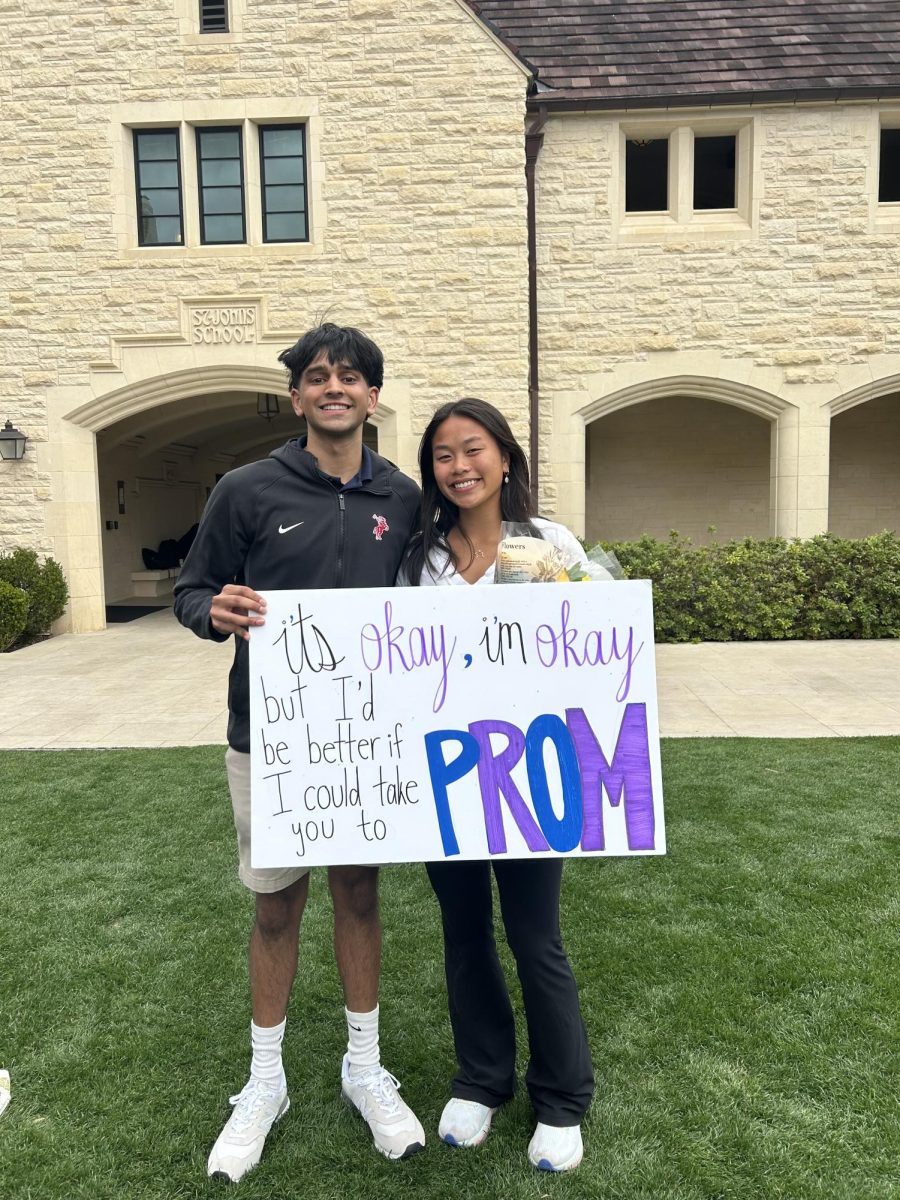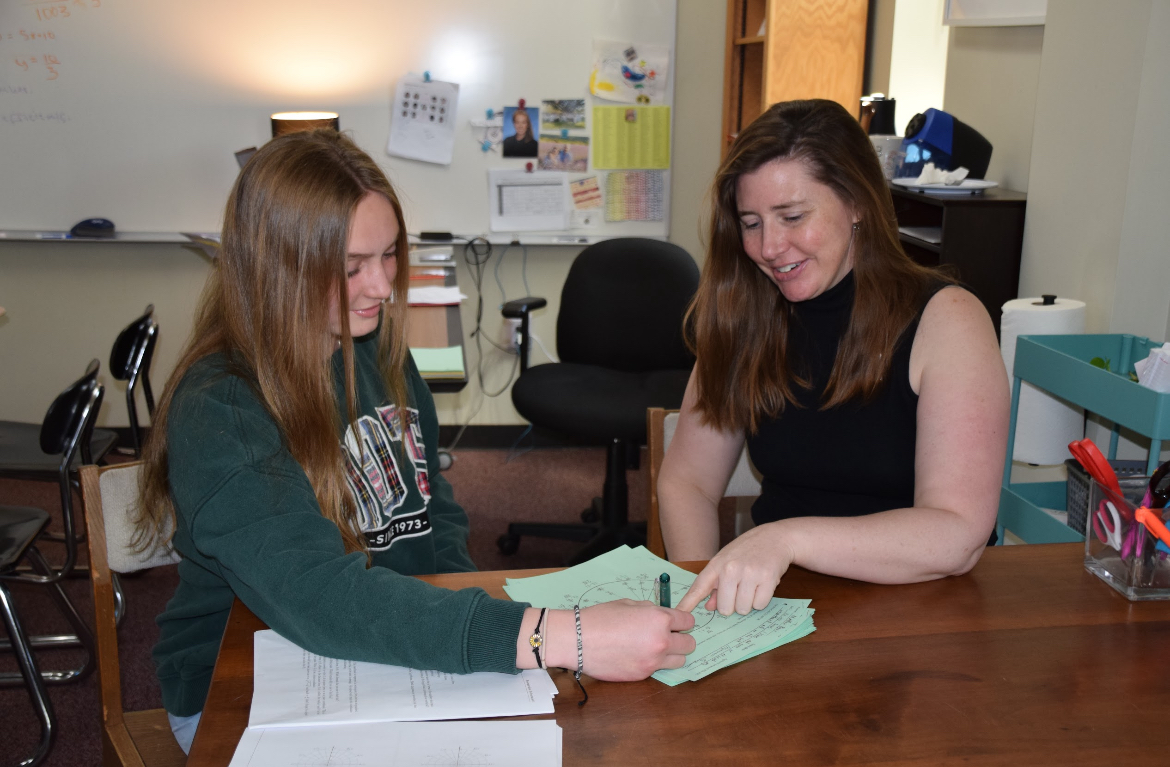The end of an era: Longtime English teachers leave a lasting legacy

After 11 years of performing songs at school gatherings and leading student meditations, Upper School English teacher Brian Beard (‘95) is concluding his journey at St. John’s.
During his time at the School, Beard taught a variety of classes across three grade levels, including senior seminars and English I and II. Beard’s favorite books to teach were Simone Weil’s “Gravity and Grace,” Lao Zi’s “Dao De Jing” and Mary Shelley’s “Frankenstein.”
“All three are stunningly brave and creative attempts to explore the essential question of what it means to be a good human,” Beard said.
Beard’s favorite senior seminars were the “The Art of Subtraction” and “What is the Good Life?” Through those seminars, Beard took the Socratic dictum that “the unexamined life is not worth living” to heart. His students questioned preconceived notions and inherited assumptions about the meaning of life and ultimately drew their own conclusions.
“It was gratifying to support students at a pivotal point in their lives as they engaged in this kind of essential reflection,” Beard said.
Some of Beard’s best moments during his time at the School were the service trips to Bolivia and Peru. He also highlighted his Songwriting Club workshops and Meditation Club meetings. Beard’s favorite traditions were chapel talks and musical performances.
Beard has noticed significant changes in St. John’s as he transitioned from being a student to a teacher at the School. Some differences he noted were the more racially diverse student population, the blooming of affinity groups and the better understanding of mental wellness and learning differences.
Beard also noted how the School grew in population. During his time, Senior Tea was a “more modest affair.” Internet access, smartphones and social media were non-existent in school as well.
Moving on to his next journey, Beard says he will “miss the wisdom, kindness, intelligence and humor of the faculty and staff, as well as the intellectual curiosity of the students.”
Beard has now relocated to Tunisia to teach at the American Cooperative School of Tunis.
“I hope I have inspired my students to, as Joseph Campbell put it, ‘say a hearty yes to their adventure,’” Beard said. “When I was in high school, my English teachers were the adults in my life who most helped me experience the life-giving power of stories. To be able to give back in a similar way is tremendously gratifying.”
From sponsoring Feminist Literature club to playing Mafia with her advisory and hosting the horror movie club, English teacher Mary Mitchell has become an integral part of the School’s community. After seven years of building a safe space for students at the School, Mitchell will continue her teaching career in California.
When Mitchell read Jane Austen’s “Persuasion” for the first time, it opened her eyes to how meaningful writing could be and she fell in love with English. In graduate school, Mitchell was an avid English researcher until she realized that she had to complete a teaching requirement as well. Although initially wary, Mitchell quickly realized she wanted to share her passion for literature with others.
“It was much more fun to share my joy and enthusiasm for reading and writing than it was to do it on my own,” Mitchell said.
During her time at the School, Mitchell has created a welcoming environment in her classroom.
“I remember meeting her during freshman orientation and when I walked in her room, she smiled and made me feel right at home,” Mitchell’s advisee Claire Field said.
Mitchell cherished the special process of watching her advisees go through high school and nurtured those connections with her easy going and supportive nature. Her door was always open if students wanted to talk about classes or just share what was on their mind.
“Ms. Mitchell’s ability to inspire genuine, heartfelt conversation, made my advisory feel like a family that I always enjoyed returning to,” advisee Mark Doan said.
Mitchell also fostered a sense of community in her English classroom by cultivating good discussions where every student could share their thoughts freely.
“It is important for students to know that it is okay for them to have different opinions and interpret the text in different ways,” Mitchell said. “We encourage them to listen to their peers because that exchange helps the students’ ideas get more interesting.”
From drastic shifts in the English curriculum to the cultivation of a new school schedule, Mitchell watched the school grow. She enjoyed searching for novels and assignments that hopefully madke a meaningful impression on her sophomore students.
“Whenever students come back and tell me that reading “Frankenstein” in my classroom changed the way they viewed the world, it shows me the valuable impact of my teaching,” Mitchell said.
Additionally, Mitchell loved when she saw students grow throughout the school year, expressing themselves through writing and tackling various genres.
“I’ll miss the excitement and curiosity for learning that I saw in all of my students,” Mitchell said.
Mitchell adored the creativity that shines in each aspect of the School. She was always in awe of the grandiose theater and orchestral productions where students can showcase their talents.
“The moments that stick with me are when I see students celebrating their passions and pursuing the things that they love,” Mitchell said.
Mitchell will be moving to California to continue her teaching career, and she hopes to continue to promote open mindedness and kindness at her new school.
“It has been such a wonderful place to work and I’ve learned so much from my students and colleagues here,” Mitchell said. “I will miss the School very dearly, but I’m also excited for a change.”
English teacher Warren Rawson’s classroom was unlike any other space on campus. It was like a museum, filled with personal artifacts of all sorts: a giant red drum hidden behind a row of desks, stuffed koalas crouched on packed bookshelves, bulletin boards coated in colorful stickers and a massive photograph of a Hawaiian jungle fowl.
After 11 years at the Upper School, Rawson retired in May. Although his classroom is now empty, he leaves behind a legacy of levity and warmth.
Rawson grew up in Orange, Texas, a small town near the Louisiana border. He discovered his love of literature at a young age: “When I was a kid, I’d read anything,” he wrote in an email to The Review.
He attended the University of Texas at Austin, where he graduated with a major in history and a minor in English. He then flew to Virginia to pursue his law degree at Washington and Lee University.
A few years later, though, Rawson decided to change careers; he began the graduate program in English at the University of Houston and earned his PhD in 2006.
“At some point in college or graduate school, I came across some scholarly work focused on narrative and the ways historians and fiction writers tell stories,” he said. “And so, here I am, studying stories of all kinds.”
Scarlett Suffel (‘24) signed up for Rawson’s Creative Writing I class “on a whim.” While she initially held some reservations about taking an additional English class, she now sees the decision as “the greatest whim ever.”
“It was by far my favorite class. Everyday, that was what I looked forward to,” Suffel said. “When we didn’t have it, we would all physically be sad.”
According to his students in Creative Writing I and II and AP English, Rawson’s teaching style was somewhat unorthodox. He often started classes by asking students to draw spirals on pieces of paper—but if they accidentally crossed lines, Rawson warned that they would be electrocuted.
Senior Turner Edwards, a student in both Creative Writing I and II and Rawson’s AP English class, at first found the activity puzzling. But during a conversation with Rawson one day after class, he discovered the spirals’ true value.
“It is a way to get students to focus if they’re distracted. It is a way to recenter, and that makes sense, because it is a spiral,” Edwards said.
Spirals were not the only way Rawson kept his classes engaged: he was known for his wit, drawings, and occasionally juggling. According to Edwards, “strict seriousness and monotony wouldn’t get you very far” in Rawson’s classroom.
“You had to think outside of the box,” he said. “And thinking outside of the box meant being funny and telling jokes, and being open to smiling and laughing a little bit in class.”
While laughter was common in his classroom, Rawson himself is not boisterous. Instead, he is often soft-spoken; his light-hearted demeanor is equally measured.
“A lot of favorite teachers are loud,” said senior Caroline Chiao, who took Creative Writing I and II. “They have a very upfront personality. Dr. Rawson was a little more reserved, but hilarious.”
Rawson’s methods of teaching grammar and rhetoric were as innovative as his spirals. During one class, Edwards recalls Rawson demonstrating the difference between descriptive and prescriptive grammar through writing a single sentence: “President Reagan said that he was going to send the Marines to El Salvador.”
“With one short exercise, he demonstrated the constraints and the possibilities of the written word,” Edwards said.
Chiao kept every handout Rawson distributed. They currently sit in a filing cabinet in her room, a small collection of poetry, short stories and writing tips. Chiao especially enjoyed the poems Rawson shared: though they varied in subject matter, she described them as simultaneously “serious and unserious.” Some of her favorites include “Ode to the Midwest” by Kevin Young, and “Lying in a Hammock at William Duffy’s Farm in Pine Island, Minnesota” by James Wright.
“He did a wonderful job of curating our reading list,” Chiao said. “I enjoyed like 99% of the poems he gave—except “I Hear America Singing.””
Chiao’s distaste for the famous Walt Whitman poem, which she says is “utter garbage,” sparked a farcical feud between her and Whitman that developed into an inside joke within the Creative Writing class. Her self-proclaimed “troubling relationship” with the writer was worsened by the enormous poster of Whitman that loomed on one of the crowded walls in Rawson’s classroom.
(While Chiao was not fond of the Whitman poster, Rawson’s print of Henry David Thoreau, adorned with the caption “DISOBEY,” now hangs on her wall).
“I Hear America Singing” aside, Rawson’s selections of prose in both his AP English classes and Creative Writing often produced nuanced discussions among students.
“The best part of the day is when you have a good class, with the students engaged and talking, and everyone is relaxed and enjoying the discussion,” Rawson said. “And the conversation teaches us all something.”
Rawson’s personal favorite work to read with students is Toni Morrison’s “Song of Solomon.” Although every AP English teacher is required to teach the novel, Edwards says that Rawson understood “Song of Solomon” more than “any other teacher I’ve had teach any kind of work.”
“Learning that novel has been one of the most rewarding things I’ve ever done,” Rawson said.
Rawson often guided his classes in dissections of “Song of Solomon” at the sentence level to demonstrate the intricacies of Morrison’s prose. He also drew family trees and pictures of certain moments to help students visualize the connections and conversations between characters.
“Dr. Rawson just knows the material very well: how things work, what to explain and what not to explain,” Edwards said. “He understands how the book connects in a way that makes it very compelling. It is mostly because of the way that he taught that it has become my favorite book.”
Rawson’s quizzes on the “Song of Solomon” and other assigned works are part of the reason why his bookshelves were chock-full of koalas. Years ago, he borrowed some reading checks from fellow English teacher Clay Guinn that mentioned the marsupials as joke answers to multiple-choice questions.
“I included a few more, and suddenly everyone thought I was into koalas. I’m not against koalas,” Rawson said.
Every item in his koala collection were gifts. The enormous photographs that hung in his classroom, however, were taken by Rawson himself. While his photos of tennis greats like Roger Federer and Venus Williams were popular amongst students, the jungle fowl is Rawson’s favorite.
“I love that the bird was sitting on the rim of a garbage can when I took the picture, though from his look, you’d think he was somewhere much more significant,” he said.
Suffel considers her time in Creative Writing as one of her most impactful experiences at St. John’s. Under Rawson, her class shared both moments of hilarity and a passion for writing.
“I’ve never had such a tight knit classroom environment where everybody is on the same page about how much we love the class,” she said.
At the end of the year, Rawson’s students in Creative Writing II gifted him an anthology of blackout poetry made from various recycled copies of Imagination. The anthology—titled “Mallard Time” in honor of one of Chiao’s previous blackout poems—also contained stickers and photos related to inside jokes.
“He really cared about us, and we really cared about him,” Suffel said.
Rawson has left his mark on countless students over the past decade. In 2016, Rawson was voted by the graduating class to deliver the faculty speech at Baccalaureate. It is an occasion that he says he is proud of to this day.
“Being recognized by the students is one of the nicest rewards you can receive as a teacher,” Rawson said.
















